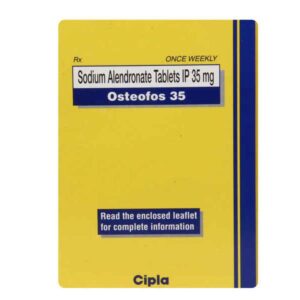ALENDRONATE
ALENDRONATE: Alendronate is a medication used for the treatment and prevention of osteoporosis in postmenopausal women and in men. It belongs to a class of drugs known as bisphosphonates and is sold under various brand names, including Fosamax.
The primary mechanism of action of alendronate is the inhibition of bone resorption. It works by binding to the bone and suppressing the activity of osteoclasts, the cells responsible for bone breakdown. By decreasing bone resorption, alendronate helps to increase bone mineral density, thereby reducing the risk of fractures.
The recommended dose of alendronate for the treatment of osteoporosis in both men and women is 70 mg taken orally once per week or 10 mg taken daily. It is important to take this medication on an empty stomach with a full glass of water, at least 30 minutes before consuming any food, beverages, or other medications. This is because alendronate can irritate the esophagus if it remains in an upright position while eating or drinking.
Common side effects of alendronate may include gastrointestinal symptoms such as abdominal pain, nausea, heartburn, and diarrhea. Some individuals may also experience musculoskeletal pain or joint swelling. In rare cases, severe side effects like osteonecrosis of the jaw or atypical fractures of the thigh bone may occur. It is important to discuss any concerning symptoms with a healthcare provider.
Alendronate should be used cautiously in patients with certain conditions, such as esophageal abnormalities or severe kidney problems. It is also not recommended for individuals who are unable to sit or stand upright for at least 30 minutes after taking the medication.
Overall, alendronate is an effective medication for the treatment and prevention of osteoporosis. However, it is essential to follow the dosing instructions carefully and be aware of potential side effects. Consultation with a healthcare professional is recommended to determine the suitability of this drug for individual patients.


